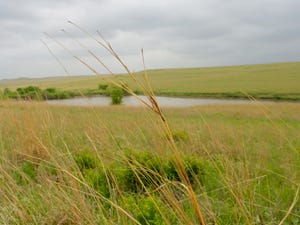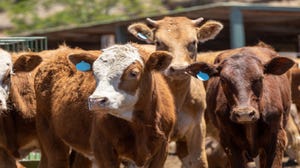September 16, 2014

I was recently taken to task by Loghan Call, a self-described “idealist” vegan blogger, who has a goal to “end factory farming in America by 2016.” I’m not sure if Call has ever been to a farm or ranch, or where he envisions getting his food from if there are no more agriculturalists by 2016, or if he has ever wondered how much water it takes to make the nut butters and tofu for his vegan lifestyle, but those are topics for another day. Today, I want to address his criticism of my evaluation of the documentary, “Cowspiracy,” which essentially blamed a world water crisis on beef cattle.
Read my original post: Why Ranchers Should Care About The Documentary, "Cowspiracy."
If you want to read his musings to make sure I cover everything in my rebuttal, click here.
To start, I’ll admit that Call is good at math. He broke things down so well that it seems like a cut-and-dried argument that to eat a burger is a greater culprit for water waste than anything else. However, he hasn’t looked at the whole picture. You see, comparing the water used to produce a burger to what it takes to make a t-shirt or manufacture a car isn’t comparing apples to apples. But, of course, it was my example in the first place, so it's obvious I need to add a few more considerations to clarify my point.
Subscribe now to Cow-Calf Weekly to get the latest industry research and information in your inbox every Friday!
I won't attempt to dazzle you fancy math, but I will invoke some common sense.
Here are six reasons you don’t have to feel guilty about eating a burger.
1. The water used by a cow helps to convert grass into food for people. Cattle graze on land that is too steep, hilly or rocky for crop production. Cattle can utilize terrain that would simply have no productive use if we didn’t graze cattle on it. Thus, they can convert forage growth on untillable land into a top protein, and their grazing supports wildlife, aerates the soil, and helps reduce wildfires.
2. Cattle don’t just provide us with beef, but byproducts, too. Consider the water usage needed to make synthetic replacements for all of the byproducts we get from beef -- insulin for diabetics, stearic acid for use in our tires, crayons, deodorant, makeup, etc. To be able to replicate these items without beef by-products would not only require a lot of water, but also fuel for manufacturing and transportation.
3. If we want to talk about water waste, let’s look at our own usage. My original example only looked at the water that was wasted from leaks in New York City. Let’s consider the water actually used by American citizens on a daily basis. In just the morning hours, a typical morning might look like this -- drink a glass of water, brush our teeth, take a nice hot shower, use water to make our coffee, wash our breakfast dishes, and perhaps start a load of laundry before we head off to work. These would be considered essential uses of water in a first-world country, but what about the non-essential use?
4. Did Americans feel bad about participating in the ice bucket challenge, as they poured water over their heads to raise money for a cause? How about watering the lawn to make sure it stays a beautiful shade of green and letting part of that water run down the street and into the storm drain? If you like to golf, the course stays perfectly green, which also requires water. Are these effective uses of water? Does this water help feed the world and offer important byproducts? Hardly.
5. Water is essential to life, something we are in dire need of in many parts of the nation. California and parts of Texas continue to suffer from drought, so it’s important to be conscious of our water usage. But let's not throw the baby out with the bath water. To blame water waste on a cow when we have a growing population demanding more and more water for our personal use is simply ridiculous. We must look internally in how we can reduce our water use. This means shorter showers, skipping the coffee, turning off the water when we brush our teeth, washing dishes by hand instead of using the dishwasher, judicious watering of our lawns, and skip dumping water on our heads and just donating the money to our favorite cause.
6. Finally, “Cowspiracy,” is using fear to create buzz and make money. Fear-mongering is what makes a mom afraid to buy anything but organic food for her kids, and it makes her worry about whether the food she buys is safe to eat unless she paid a premium for something all-natural. Because today’s consumer is three generations removed from the family farm, it’s harder to understand where food comes from because most folks don’t get to see it being raised outside their backdoor. That’s when folks turn to the Internet. Unfortunately, all too often, the information found there is based on speculation, sensationalism and a motivation to make money. That’s why it’s so important for ranchers to be a part of these online conversations, lest we leave the talking up to the entertainment industry.
How would you respond to this blogger’s post? What are ways we can reduce our water usage? What would you tell consumers who were worried about water and beef production? Share your thoughts in the comments section below.
The opinions of Amanda Radke are not necessarily those of Beefmagazine.com or the Penton Farm Progress Group.
Other BEEF stories to enjoy:
Want More Money For Your Calves? Superior Study Says Weaning & Preconditioning Pays
September Cattle Market Outlook | Bull Run Cools, But Market Upside Possible
10 Ways To Have A Stress-Free Weaning Day
Effective Heifer Development Means Thinking Early & Long Term
You May Also Like



